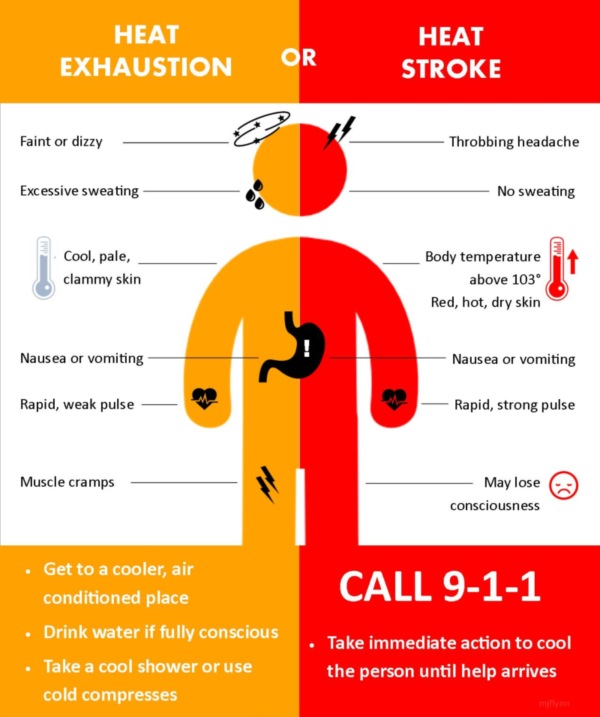- Find areas with air conditioning.
- Avoid strenuous activities.
- Prepare for the heat and exposure to the elements with a few key considerations. Wear light clothing. Wear a wide-brimmed hat if you must be outside. Wear sunscreen on any exposed skin.
- Check for signs of heat related illness. Seek medical care if symptoms include nausea or throwing up, dizziness or confusion, of if they last for longer than 1 hour.
- Check on neighbors, especially those that may be more susceptible to heat-related illness.
- Drink lots of water.
- Never leave people or pets in a car, even with the windows open.
- Know that fans do not reduce body temperature. Fans create airflow and a sense of comfort, but they do not help prevent heat-related illness.
- If you go swimming to cool off during the heat, make sure you're doing so safely. Check out these safe swimming tips(PDF, 6MB).
Heat-Related Illness
Heat-related illnesses are preventable and occur when the body can't cool itself down fast enough.

Heat Cramps
SIGNS: Muscle pains or spasms in the stomach, arms, or legs.
WHAT TO DO: Cool down the body by moving to a cooler location and removing excess clothing. Drink water or sports drinks. Seek medical help if cramps last more than 1 hour.
Heat Exhaustion
SIGNS: Heavy sweating, muscle cramps, pale skin, nausea or vomiting, dizziness, or passing out.
WHAT TO DO: Go to a cooler location and lie down. Take a cool bath or place cool, damp cloths on the body. Loosen clothing. Drink water if alert. Seek medical care if symptoms last more than 1 hour or if the person throws up.
Heat Stroke
SIGNS: No sweating, very high body temperature (above 103° F), red, hot, and dry skin, nausea or vomiting, headache, confusing, or passing out.
WHAT TO DO: Call 9-1-1 right away. Do not give the person anything to drink. Move the person to a cooler location. Use cool cloths or a cool bath to lower the person's body temperature.